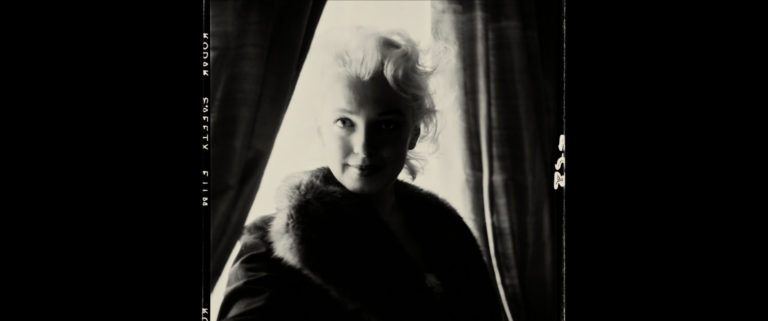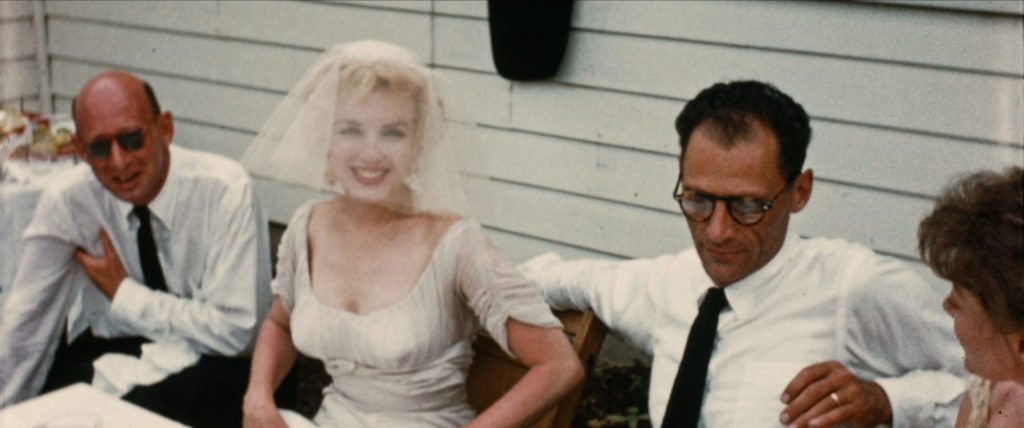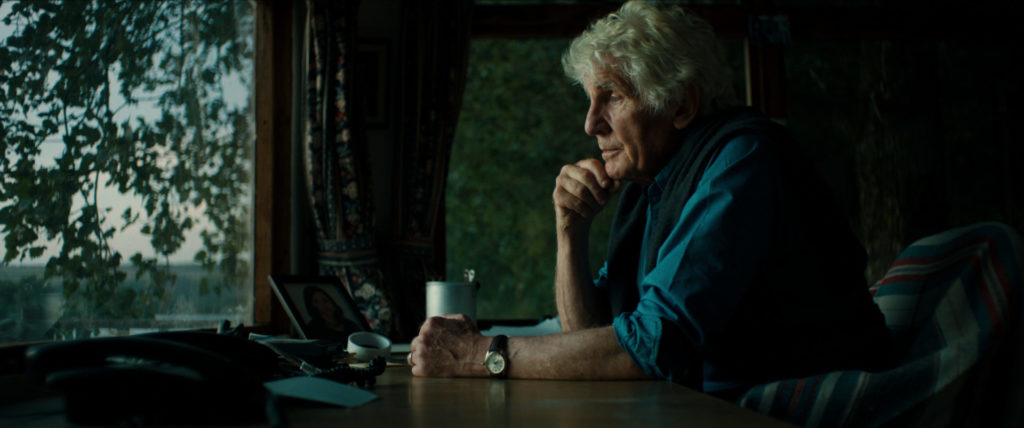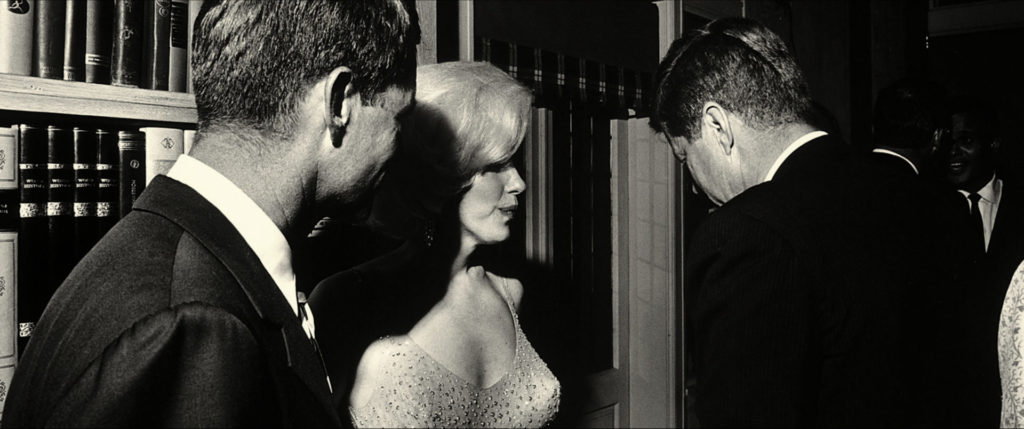
Synopsis : Anthony Summers, the author of the book Goddess (1985), explains he began researching Marilyn Monroe after he learned that the Los Angeles County District Attorney was reopening the case of her death. Summers subsequently spent three years collecting 650 tape-recorded interviews with people who either knew Monroe in her lifetime or had knowledge concerning her death. The audio of the interviews is original, but actors perform lip-synced reenactments.
Exclusive Interview with Director Emma Cooper
Q: How did you meet writer Anthony Summers who wrote the book about Marilyn Monroe called “Goddess: The Secret Lives of Marilyn Monroe” (1985) and how did that meeting lead to you making this film?
EC: Tony is quite a very well-known journalist who has written several books. I had worked with him before on a different one of his books. In the process of that, he was very keen for me to look at the other books he’d written before. He was very insistent that we read the book about Marilyn Monroe.
I thought, “Great. Well, when’s it coming out?” When he told me that it had come out in the early ’80s, I was less [inclined] to read it. I thought, “What would I find within a book that’s been out for 40 years?” It took me some time to read it. When I did, I felt like there were real revelations in it, things that I didn’t know.
I went to Ireland and spent some time with Tony, with him walking me through the whole book and showing me his research. Tony writes everything down and keeps every single piece of paper he’s ever written on, so his archive is extensive. And he played me these tapes. I realized that there was a way of telling a story about Marilyn Monroe that felt different from the films about her that I had known before.
Q: Marilyn was born in 1926, and her parents divorced in 1928. How did Marilyn come through 10 foster homes and 2 years of orphanage? I thought Marilyn’s mother was still around to take care of her.
EC: Her mother was in and out of mental institutions for all of [Marilyn’s] childhood. She left Marilyn for the first time when she was two weeks old, and then she would continually come back and then be able to care for Marilyn again; then she wasn’t able to do it.
At one time when Marilyn was a child, her mother even managed to get them a house and she put a white piano in it, and began building a life for them both. Unfortunately, she ended up in institutional mental care again.

Q: Do you think that her fear of abandonment and the survival skills developed because of this circumstance of growing up in foster homes and the orphanage — made her who she became?
EC: Yeah, I really do. I think that it gave her… She described herself as a “waif” which I think is a really interesting word. She went from being a waif to an enigma. The fact that she had to deal with so many of those things when she was a child gave her a lot of her strength — but also gave her a lot of vulnerability. Also had a lot of pain when she was older. That mainly manifested itself in her romantic relationships.
But you’re absolutely right. It was the thing that made it so successful in navigating a very male-dominated Hollywood — even more male-dominated than it is now. Absolutely, she had an inner strength that that lack of care and of paternal and maternal stability in her life made her incredibly ambitious, but I also think made her fall prey to the wrong type of man romantically.
Q: Speaking of a male-dominated society, she met Joseph M Schenk, who was the head of 20th Century Fox back then.
But Marilyn wasn’t a pushover.
She wanted to be an actress, so she work the system to her own advantage, which is different how most of people in Hollywood treated her, as a “dumb blonde.”
EC: In terms of her navigating the world of Hollywood on her own, yeah, I think she really, really wanted to be a star. I think that she was really successful at it. And I think that maybe because of her detachment as a child, she was able to look at the way those studios worked, and the way they owned and consumed people.
She was able to be detached from that system and play the observer, and play it back at them a little bit. She used some of those men just as much as they were using her. I think everybody knew what they were doing. She was able to be very detached and very singular-minded about it — and therefore, very successful.
As you know, she had just set up Marilyn Monroe Productions. What other woman at that point would have done that and decided that they could do it alone? She was never really beholden to any of those men after she had become a star. Maybe at the beginning a bit; but afterwards, not really.

Q: It’s fascinating to hear that John Huston and Jane Russell, who worked with Marilyn in “Gentleman Prefer Blondes,” complimented her skill as an actress; she memorized the script in a couple days, and after they shot the film all day, she’d still visit her acting coach. That’s completely different from what people imagined.
EC: I honestly didn’t know that either. It was extraordinary that she would work a full day and then would go to her coach, as they say in the film. It’s been a real injustice that what we know about Marilyn Monroe is that she turned up late to set, didn’t learn her lines, and was a bit ditzy. Well, it’s just completely incorrect.
She was diligent and worked hard. People like Billy Wilder or John Huston, all thought she was a great actress. She even took time out and moved back to New York because she really wanted to hone her craft. She read a lot, and became very well-read. Maybe by moving away from her childhood demons, of feeling inadequate, I don’t know, that’s what did it.
I completely agree with you. This was a side to her that I had not known before. I was very happy and excited that her friends and colleagues were very insistent on those tapes, that they told Tony that, that they put that evidence forward on her behalf.
Q: The evidence in those the tapes that lead up to Robert Kennedy, who hid everything under the rug, in a way, after she committed suicide — when you heard about that, what was your reaction?
EC: I was just amazed that Tony had managed to get so much evidence, that the timeline we all know of — that’s written in so many books about her death and about her last few hours — was evidenced as being incorrect. I think the reasons and evidence that he puts forward that has something to do with getting Bobby Kennedy away from being near her was really an incredible revelation.
It’s really important to state that we don’t have any other evidence for any wrongdoing or anything like that. We just know that there was a coverup and that they needed to get away from this “starlet” who unfortunately had now passed away.
I find it incredibly upsetting and incredibly moving that what I knew about Marilyn Monroe’s death was from the line in Elton John’s song: that she was found “naked dead in bed.” All the circumstances around that might actually have been different than we knew. I feel an enduring sadness thinking about that.
I will never know the real reasons why. I don’t think any of us will, but it did happen.
Do you know what I mean? It’s very sad, and I think that hopefully, we’ve uncovered some truth and that truth is not always bound in conspiracy theories, but somewhere in the middle.

Check out more of Nobuhiro’s articles.
Here’s the trailer of the film.

